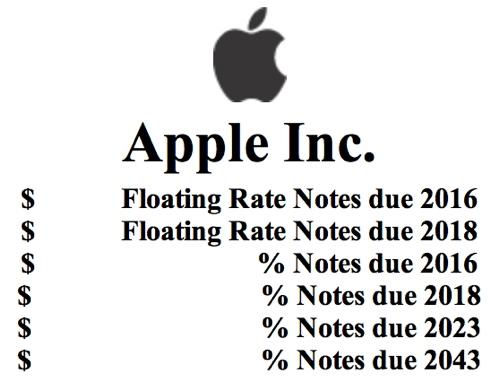Apple will sell $17 billion in debt in its first bond offering since 1996, as the company borrows funds to fuel its $100 billion capital rewards program.
Update: Apple's bonds will amount to $17 billion, it was confirmed later on Tuesday by The Wall Street Journal. That number is in fact a new dollar amount record for a U.S. corporate offering.
The iPhone maker is planning to issue date with floating-rate notes maturing in 2016 and 2018, along with fixed-rate bonds with interest dates in 2016, 2018, 2023 and 2043, Apple revealed in a 424(b)(2) filing filing with the U.S. Securities and Exchange Commission on Tuesday.
There is strong demand for Apple bonds, which could allow the company to sell as much as $20 billion in debt, Tom Tucci of CIBC World Markets Corp. told Bloomberg. If Apple were to reach that number, it would be the largest dollar-denominated offering in history.
Apple has $145 billion in cash, but a majority of those funds are overseas and would need to be repatriated according to U.S. tax laws in order to be used for share repurchases. As a result, Apple has instead opted to borrow, in addition to using its domestic cash, to fund its $100 billion capital rewards program.
While Apple's bond sale could become the largest in history, the company's share repurchase authorization plans are already record setting. Apple plans to repurchase $60 billion in shares through the end of calendar 2015, accounting for the bulk of its $100 billion capital initiative.
The remaining money will be used by Apple's quarterly dividend, which was bumped 15 percent last week to $3.05 per common share.
"We are very fortunate to be in a position to more than double the size of the capital return program we announced last year," Apple CEO Tim Cook said in a statement. "We believe so strongly that repurchasing our shares represents an attractive use of our capital that we have dedicated the vast majority of the increase in our capital return program to share repurchases."
 Neil Hughes
Neil Hughes








 Charles Martin
Charles Martin
 Christine McKee
Christine McKee
 Wesley Hilliard
Wesley Hilliard
 Malcolm Owen
Malcolm Owen
 Andrew Orr
Andrew Orr
 William Gallagher
William Gallagher
 Sponsored Content
Sponsored Content








62 Comments
And on the mention of yet another "largest in history" milestone from Apple, the stock falls $200 per share.
[quote name="Tallest Skil" url="/t/157282/apples-six-part-bond-offering-could-be-largest-in-history#post_2319124"]And on the mention of yet another "largest in history" milestone from Apple, the stock falls $200 per share. [/quote] I hadn't checked AAPL today and you just nearly made me do a very childish thing!
I find the floating rate component of the issue to be interesting. Initially, I thought that it was a bit weird, but thinking some more about it, the move makes sense. Coupon rates will be very low for sure, but the real reason is, I am guessing, it will be a natural hedge against the interest on cash in the next few years.
I'm wondering... why has no one more knowledgable about finance explained what the impact of a $60Bn share buy back is? Foolishly it seems to me if the market capitalisation of AAPL is $413Bn then this effectively would increase value of the other shares by 15%. Or in other words a mere $60 dollars per share. As this was announced when the share price had fallen to about $400, then it looks as though it will only take a small additional rise in the price to use up that capital. In this case... why is Apple issuing $20Bn that they have to pay back later? Maybe it makes sense to use this tactic if there is a future good use for the cash held abroad, e.g.: in capital investment. But I've read no analysis of what this all means, and I'd like someone more knowledgable to explain it to myself and other shareholders.
Companies buy back their shares when they do not have anything better to spend their cash on from an ROI perspective. Which is sad; I would think they would invest extensively in new product development. This screams they do not have anything nor any ideas on the next game changing product.